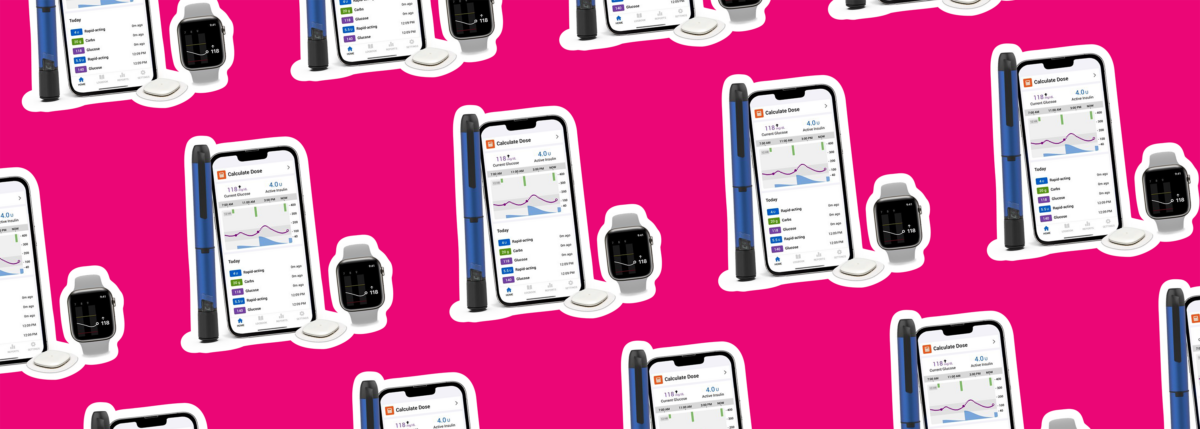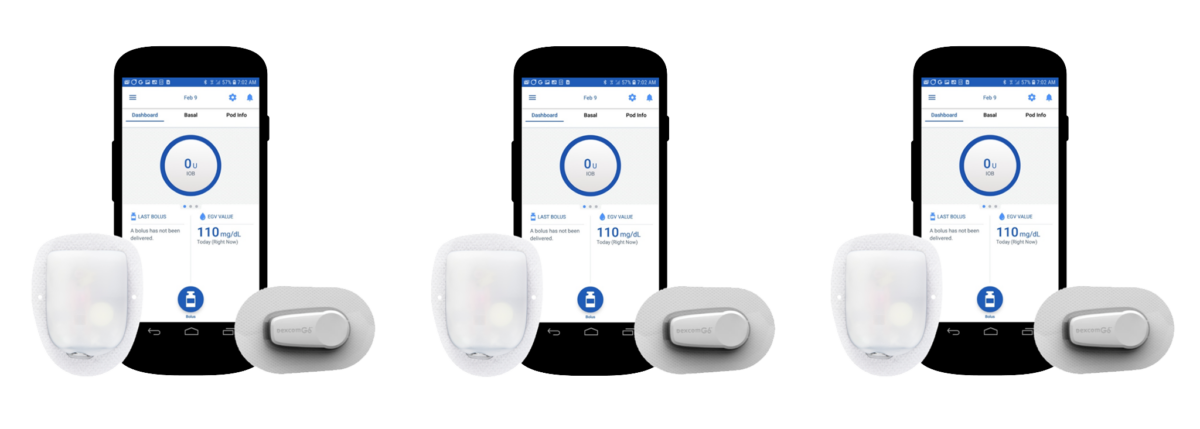Omnipod 5 Receives FDA Approval
Written by: Lala Jackson
3 minute read
January 28, 2022
Editor’s Note: Pod and Dexcom G6 are shown without the necessary adhesive in the accompanying images.
Throughout 2022, Insulet’s Omnipod 5 automated insulin delivery (AID) system received FDA approval—marking the first tubeless AID system for people with type 1 diabetes who take basal and mealtime insulin.
- January 28, 2022: Approved in people with type 1 diabetes ages 6 and older—limited release
- August 1, 2022: Full-market release in the United States
- August 22, 2022: Approved in people with type 1 diabetes ages 2 and older
What is the Omnipod 5?
The Omnipod 5 is the only tubeless AID system for people with type 1 diabetes who take basal and mealtime insulin. AID systems are also commonly known as closed-loop or artificial pancreas systems.
The Omnipod 5 is the only FDA-approved patch pump—meaning it has no tubing and sits directly on the skin—with a closed-loop insulin delivery system, as well as the only FDA-approved closed-loop system that can be controlled with a smartphone. Users will still be able to use Omnipod’s handheld controller, the personal diabetes manager (PDM), if they prefer.
The approval followed Omnipod 5’s pivotal trial, which published study data in June 2021. In adults, the study showed increased time-in-range (TIR)—the percentage of time a person’s blood glucose level is in a healthy target range—from 65 to 74 percent, which translates to 2.2 hours more TIR per day. Study participants saw an average reduction of HbA1c from 7.16 to 6.78 percent, with mean glucose levels decreasing from 161 to 154 mg/dL.
In children, the study showed similar improvements—TIR increased from 53 to 68 percent or an additional 3.7 hours per day, HbA1c was reduced from 7.67 to 6.99 percent, and mean glucose levels decreased from 183 to 160 mg/dL.
“Omnipod 5 is a life-changing technology that we believe will revolutionize the market and the lives of people with diabetes,” said Shacey Petrovic, president and chief executive officer of Insulet, in a press release issued by the company. “We are incredibly proud of this simple-to-use, elegant system, designed to deliver unmatched freedom and to greatly simplify insulin management and improve glucose control for our users.”
AID systems integrate with continuous glucose monitors (CGM). With regular readings from a CGM, the pumps alter insulin dosing based on carefully programmed algorithms combined with each person with diabetes’ specific insulin needs, including background basal rate, carb ratios, etc. Previously available closed-loop systems were Tandem’s Control-IQ (which integrates with the Dexcom G6 CGM) and Medtronic’s MiniMed 670G and 770G (which integrates with Medtronic’s CGM, the Guardian™ Connect system). The Omnipod 5 closed-loop technology is called SmartAdjust™.
In each system, when the wearer’s blood sugar levels are predicted to be or are already high, the pump slightly increases insulin delivery. When the wearer’s blood sugar levels are expected to be or are already low, the pump slightly decreases or altogether stops insulin delivery.
Low or high blood sugars also trigger alarms through the CGM, alerting the user that additional action may need to be taken. Closed-loop users can also set the insulin pumps to different blood sugar targets, with specific features dependent on the pump.
By releasing through the pharmacy channel, individuals with health insurance who want to try the Omnipod 5 will be able to bypass the durable medical equipment (DME) coverage system, which typically offers lower insurance coverage (leading to higher out-of-pocket costs) for insulin pumps and insulin pump supplies. For help navigating health insurance coverage with diabetes, visit our health insurance guide, originally created by our partners at JDRF.
This content mentions Insulet, an active partner of Beyond Type 1 at the time of publication.
News coverage by the Beyond Type 1 team is operated independently from any content partnerships. Beyond Type 1 maintains full editorial control of all content published on our platforms.

Author
Lala Jackson
Lala is a communications strategist who has lived with type 1 diabetes since 1997. She worked across med-tech, business incubation, library tech and wellness before landing in the type 1 diabetes (T1D) non-profit space in 2016. A bit of a nomad, she grew up primarily bouncing between Hawaii and Washington state and graduated from the University of Miami. You can usually find her reading, preferably on a beach.
Related Resources

On November 20, 2024, Medtronic received FDA clearance for its latest InPen app. This advancement...
Read more

Eli Lilly and Company is helping patients and caregivers understand important changes to Medicare Part...
Read more

Already compatible with Dexcom’s G6 and G7 continuous glucose monitors (CGMs), the Omnipod 5 Automated...
Read more

